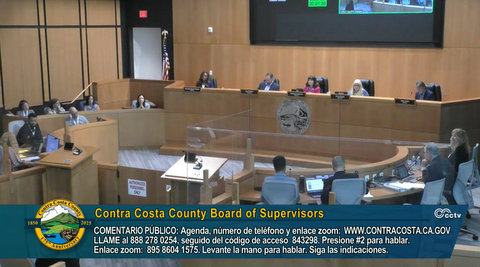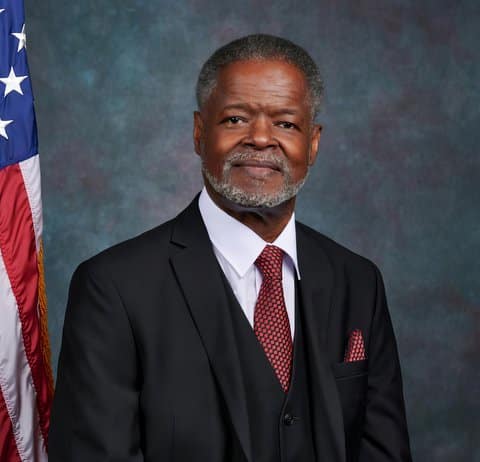
16 Aug Supervisors OK 4-Year Plan to Establish County Black Wellness Hub

(Screenshot captured by Samantha Kennedy / The CC Pulse)
By Samantha Kennedy
The Contra Costa County Board of Supervisors unanimously greenlit a three-phase implementation plan for the African American Holistic Wellness and Resource Hub that outlines the rollout of mobile services, a permanent location — and, now, the hub’s new name.
The hub, to be named in honor of the late former Supervisor Federal D. Glover, is an $8.9 million effort by the county to address racial disparities that Black residents face in health, economic development and other areas of life.
“I know Supervisor Glover is looking down, excited. So we’re making this motion together,” Supervisor Shanelle Scales-Preston said before voting to pass the plan.
The county will roll out services over the next four years, according to the plan, which includes prioritizing behavioral health services — especially for Black men — infant and maternal health, and reentry support for those transitioning from incarceration.
Kendra Carr, a co-director of the county’s Office of Racial Equity and Social Justice, said they had identified a dozen census tracts made up of large populations of African American residents that were located at the bottom 25th percentile of living conditions across the state. Those tracts were located in Richmond, North Richmond, Antioch and Pittsburg, according to Carr. The tract with the lowest score was in Antioch.
The hub’s first phase will last about five months, establishing the advisory board and issuing calls for proposals for “immediate” community-based rapid-response services, said Peter Kim, the other co-director of the Office of Racial Equity and Social Justice.
The second phase, set to begin in January, will last about three and a half years. From January 2026 to June 2029, the hub will recruit staff, including an executive director, establish a community council and board of directors, create a nonprofit for the hub, and create a 10-year sustainability plan.
“ORESJ will continue to play an active role,” said Kim. The office will support the executive director in maintaining partnerships with county agencies, health system partners, and in securing a permanent site facility.
The third phase is when a permanent hub is planned to open, according to the office. The plan proposes that the physical site will have an ongoing allocation of $1.5 million annually beginning in the 2029-30 year.
The office has proposed that the permanent site be located in Antioch, according to Kim. The Antioch City Council this year unanimously backed that idea, getting behind a site on 1650 Cavallo Road that had been identified and gained support from most residents.
Not all have been satisfied with the plan, which Carr and Kim acknowledged ahead of presenting their plan.
“While not all community leaders or residents may agree with every part of this plan, we do hope that everyone who has contributed their voice and input can see a piece of themselves reflected in the vision being proposed,” said Kim.
The amount of time and location of the permanent site have been a point of contention between the county and some residents. Gigi Crowder, executive director of NAMI Contra Costa, advocated for the county to establish a site through the 40 Voices Campaign, but decided to start a community-led hub of her own.
“Despite 40 Voices’ successful advocacy of a total of $8.9 million from the Contra Costa Board of Supervisors, we’ve been asked to wait until 2029 for the physical site of the hub to be realized,” Crowder said in a GoFundMe to support the site. “We can’t afford to wait.”
Crowder, whose NAMI organization is one of the recipients of the county’s funding for its inaugural service providers, spoke in support of the county’s hub and about her advocacy at the meeting.
“I butt heads with Kendra [Carr] and Peter [Kim] about what I would like to see happen, but they should know … I make good trouble,” said Crowder. “And this good trouble has borne some good fruit.”
But Crowder still pushed back against the physical site’s proposed location on Cavallo Road, pointing out both the safety of the area and that disparities don’t only impact African American people who are low-income.
“It also affects individuals like Miles Hall and Tyrell Wilson, who were killed in the most prestigious, wealthiest parts of the county,” she told supervisors, referring to two young Black men who were killed by police in Walnut Creek and Danville, respectively, both while experiencing a mental health crisis.






No Comments